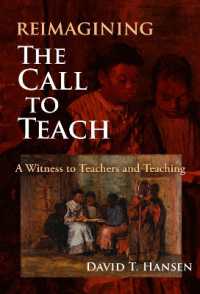- ホーム
- > 洋書
- > 英文書
- > Philosophy
Full Description
Innovative readings and creative reinterpretations of significant works in the field of ancient philosophy.
In classical Greece, the word politeia in its largest sense meant the citizens' engagement with the shared project that is the lived life of their polis, city, civic society. Ancient philosophers, poets, historians, and orators constantly reflected on what this shared project should be and how citizens could participate in it. The chapters in this collection, inspired by the work of Anthony Preus, examine some of the products of their reflections, both the written works themselves and the variety of comparative contexts into which they can be put, from the Greeks' neighboring Asian polities to contemporary philosophical engagements with similar issues. The essays in Politeia hope to inspire readers to think about their own lives in conversation with the lives of the many communities to which we belong—to not only demonstrate the idea of politeia but to bring to life politeia's connection of the individual to the collective, something that seems to be of central importance in a world of division and to be the beating heart of the discipline of philosophy.
Contents
Introduction: Politeia: New Readings in the History of Philosophy
Anne J. Mamary and Meredith Trexler Drees
Plato on Laughing at People
D. Z. Andriopoulos
Plato's Dialogues: Educating the Mind for 2400 Years
Martha C. Beck
Different Ways of Being Different, Different Ways Not to Be: Parmenides and the Critical Relativism of Alain Locke
Rose M. Cherubin
The Art of Training the Black Horse: The "War within the Soul" and Socrates' Palinode
Meredith Trexler Drees
"Riches without Envy": Picturing the Words of Philebus 40a10
Mateo Duque
Karl Marx and the Riddle of the Nicomachean Ethics 5.5
Howard Engelskirchen
The Tragedy of Natural Philosophy
Myrna Gabbe
"Turn the Brightness Outward": Muthos and Paideia in Pindar and Plato
Hyun Höchsmann
Don't Be a Drag, Just Be a Queen
Anne J. Mamary
Plato on Hate and the Limits of Morality
Phillip Mitsis
Neither an "Exact Grasp" Nor a "Complete Falsehood": The Truth Status and Rhetorical Function of the Tripartite Model of City and Soul in the Republic
Mark Moes
The Unity of Being
Parviz Morewedge
The Double Meaning of Strife in Hesiod
Joyce M. Mullan
The Myth of Er and Pamphylia's Polyglossia
Nickolas Pappas
Between Numen and Nous: Bachelard on the Awakening of Consciousness
Eileen Rizo-Patron
Justice, Accountability, and Its Limits in Plato's Republic I
Anne-Marie Schultz
Beauty Dethroned? Plato's Symposiasts on What We Love
Thomas M. Tuozzo
Forms as Causes in On Coming to Be and Passing Away II.9
William Wians
Contributors
Name Index







